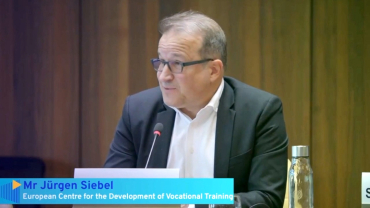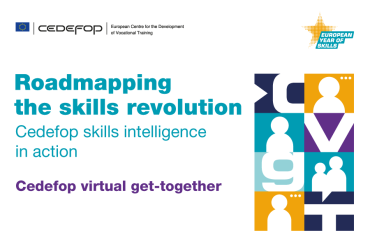The end of the European Year of Skills is more of a beginning – with a renewed focus, enthusiasm and an obligation to take action, the European Commissions’ Executive Vice-President Margaret Vestager said opening the conference ‘The European Year of Skills – what comes next?’ and added: ‘Today, having the courage to step out of comfort zones is more important than before: the economy is changing, and this is a sign of all ages, but now it goes faster and faster.’
Attended by hundreds of representatives, the event was the opportunity to share skills stories and discuss the legacy of the past 365 days.
Representatives from Cedefop and the European Training Foundation (ETF) convened to mark the conclusion of the European Year of Skills initiative, putting on the spotlight the role of skills development in navigating the green and digital transitions.
'Through collaborative efforts, we can address skills shortages and ensure that all regions, including our neighbouring ones, are equipped for the future,' remarked Cedefop Executive Director Jürgen Siebel.
'Collaboration is key to addressing the challenges we face in skills development across Europe and its neighbouring regions,' added the ETF’s Head of Skills Identification and Development Unit, Manuela Prina: 'By working together, we can ensure that no one is left behind in the transition to a greener, more digital economy.'
Looking ahead towards a “century of skills”
Mr Siebel emphasised the collaborative efforts between Cedefop and the ETF in conducting the European Skills and Jobs survey, saying, ‘those who require more training are often the ones having less access to education and training. This is a lost opportunity for Europe and highlights a critical challenge that must be addressed to ensure that all individuals have equal access to skill development opportunities.’
Ms Prina echoed Siebel's sentiments, emphasising the importance of not merely transferring problems to neighbouring regions but instead fostering cooperation for mutual benefit.
‘We need to support a win-win narrative, both for the European Union and its neighbouring regions, but mostly a win for individuals,’ she stated, also pointing to the significant role of the EU social pillar in achieving this goal.
Ms Prina further underscored the connection between peace and investment in talent, calling for greater collaboration with countries like Ukraine. She expressed her hope for peace in the region and emphasised the significance of investing in skills as a pathway to stability and prosperity. Looking ahead, she predicted a ‘global decade of skills’ and urged for increased representation of voices in EU discussions, citing the consultation with over 300 stakeholders as a step in this direction.
The contributions from both the ETF and Cedefop highlighted the importance of skills development in supporting the transition to a decarbonized and digital economy.




